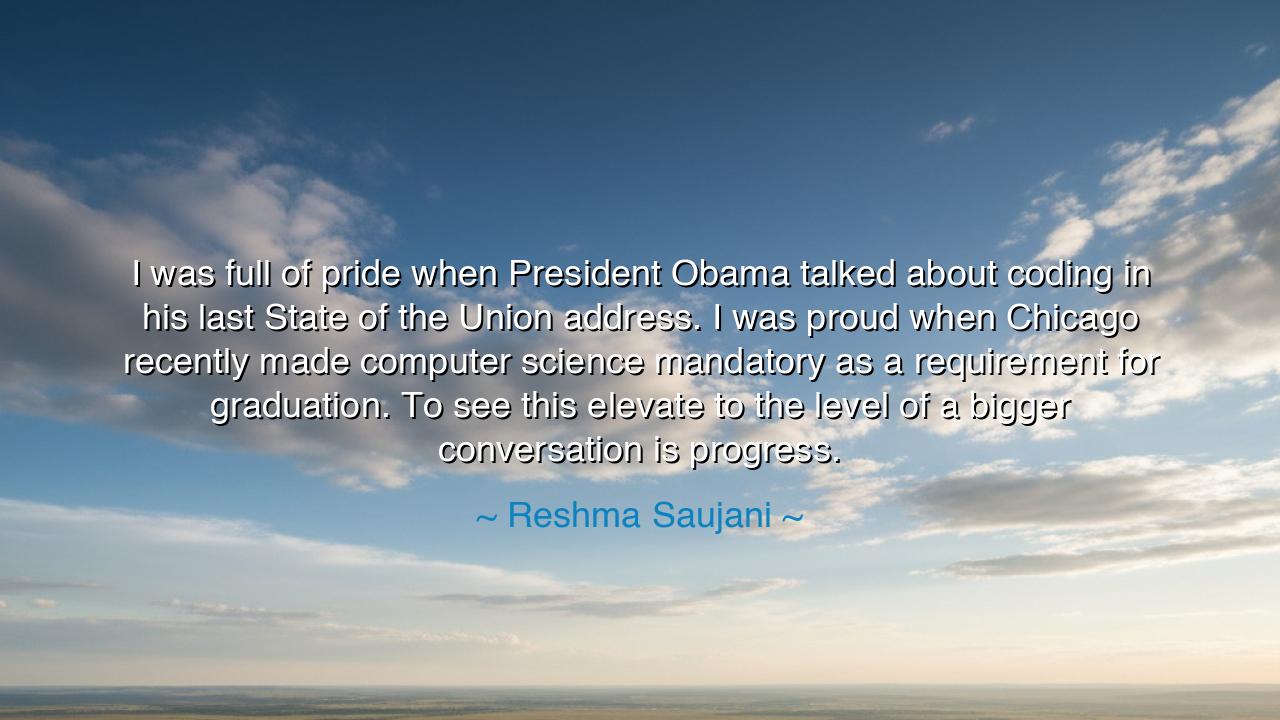
I was full of pride when President Obama talked about coding in
I was full of pride when President Obama talked about coding in his last State of the Union address. I was proud when Chicago recently made computer science mandatory as a requirement for graduation. To see this elevate to the level of a bigger conversation is progress.






The visionary and advocate Reshma Saujani, founder of Girls Who Code, once declared: “I was full of pride when President Obama talked about coding in his last State of the Union address. I was proud when Chicago recently made computer science mandatory as a requirement for graduation. To see this elevate to the level of a bigger conversation is progress.” Though these words arise from the modern age, they carry the same spirit that guided philosophers, builders, and dreamers of the past — the spirit that rejoices when knowledge becomes accessible to all and when education serves as a bridge, not a barrier. Her statement is not merely about technology; it is about evolution, equity, and the power of enlightenment to shape the destiny of humanity.
To be “full of pride” at a leader’s mention of coding is to recognize that the world is awakening to a truth long ignored — that literacy in the digital language of creation is as vital in our age as reading and writing were to the ancients. For centuries, new tools have defined each civilization: the plow for agriculture, the compass for discovery, the printing press for knowledge. In our time, code is the tool of builders, thinkers, and reformers. When President Barack Obama spoke of it in his State of the Union, he was not merely speaking of computers — he was speaking of empowerment, of a new literacy that gives every child, regardless of gender or origin, the power to build the world anew. Saujani’s pride, therefore, was not for herself, but for a generation rising beyond the limits that once defined them.
Her second note of joy — that Chicago made computer science mandatory for graduation — reveals something even greater: the beginning of institutional transformation. For change does not begin merely with speeches; it matures through policy, through the courage of societies that decide to evolve. By making coding a requirement, the city was declaring that creativity and technology are not luxuries for the privileged few but rights for every learner. Saujani’s pride is the pride of the teacher who sees the walls of exclusion crumble, who watches the gates of opportunity swing open for those who had long stood waiting outside.
This awakening finds its echoes in history. In the 19th century, when Mary Lyon founded Mount Holyoke Female Seminary, she too challenged the belief that women did not need higher education. Her work, like Saujani’s, was not just about instruction — it was about liberation. In both cases, education became an act of rebellion against the boundaries of society. Saujani’s movement, Girls Who Code, follows the same sacred lineage. By teaching young women the language of creation, she gives them not just skills, but voice — the power to participate in shaping the architecture of the future rather than merely living within it.
The heart of Saujani’s words lies in one phrase: “To see this elevate to the level of a bigger conversation is progress.” This is the wisdom of patience, the recognition that transformation begins not in grandeur but in dialogue. Progress is not born in silence — it grows when people begin to care, to ask, to dream together. Every great movement — from the Renaissance to the Enlightenment — began as a conversation that challenged what was and imagined what could be. When coding becomes a conversation, it ceases to be a privilege and becomes a possibility — one that belongs to every child who dares to dream in logic, creativity, and light.
The lesson, then, is both practical and profound: that we must not wait for progress to arrive — we must speak it, teach it, and live it. Whether it is coding, art, science, or compassion, whatever skill brings humanity closer to equality must be championed, discussed, and shared. Do not underestimate the power of a conversation, for in it lies the seed of revolutions. And when progress comes, as Saujani teaches, take pride not in the achievement alone, but in the journey — in every voice, every classroom, every young learner who steps into a world more open than the one before.
And so, let the words of Reshma Saujani echo like a hymn for the builders of tomorrow: “To see this elevate to the level of a bigger conversation is progress.” For the world changes not only through invention but through inclusion — when the tools of creation belong to all. Let us celebrate not only the rise of technology, but the rise of opportunity. Let us be full of pride, as she was, not for what we have already built, but for the generations we are now empowering to build further — a world coded not just in logic, but in justice, equality, and hope.






AAdministratorAdministrator
Welcome, honored guests. Please leave a comment, we will respond soon